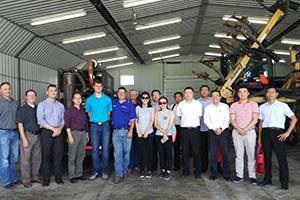A group of Chinese stakeholders and policymakers visited the United States last week to learn more about management and recycling methods for untreated manure, a practical but serious constraint facing continued expansion of livestock production there.
The team visited Washington, D.C., Illinois and Indiana where they were able to see testing facilities, crop farms and livestock operations first hand.
The trip gave participants the opportunity to learn how to promote manure recycling, which helps producers use untreated manure as fertilizer without damaging the environment, while reducing the cost to livestock producers.
The trip began in Washington, D.C., with a visit to the USDA’s National Resource Conservation Service (NRCS) and the Environmental Protection Agency (EPA) to learn about EPA regulations as well as the EPA-administered National Pollution Discharge Elimination System (NPDES) process. The information covered included the substance of the regulation as well as how it is enforce and what EPA does to producers remain compliant.
“Visiting this week helped the team learned how state-level environmental policies cooperate with other agencies,� said Wennie Liu, U.S. Grains Council (USGC) China program manager, who accompanied the team to the States.
This information was supplemented by a trip to Illinois, where the team was able to meet with the Illinois Pork Producers Association and a local engineering consulting company to discuss preparing nutrient management plans.
The visit gave stakeholders a chance to ask questions specific to their own plans as well as get the local perspective on manure management regulations. Subsequent training at the University of Illinois let participants apply manure management principles and supplement new information with tangible skills.
“Being in the Midwest allowed them to see the value of manure to agricultural production. It was the first time many members of the team were able to see application techniques first hand,� Liu said.
The Illinois visit concluded stops at local farms and testing laboratories as well as meetings with regulators before a stop at the North American Manure Expo in Indiana. There, members of the team learned about composting, material handling, surface water runoff management and solid/liquid separation, among other topics.
The Council continues to work with Chinese stakeholders to share information about manure management best practices as a way of addressing this impediment to further livestock production and, in turn, grain consumption. The hope is that by helping the Chinese livestock sector grow sustainably, this work can also open the door for future grain imports.
“The goal of USGC’s nutrient program is to encourage farmers to adopt land application techniques for manure without extensive treatment,â€� Liu said. “We look forward to seeing further developments in China’s livestock industry in the near future.â€�


